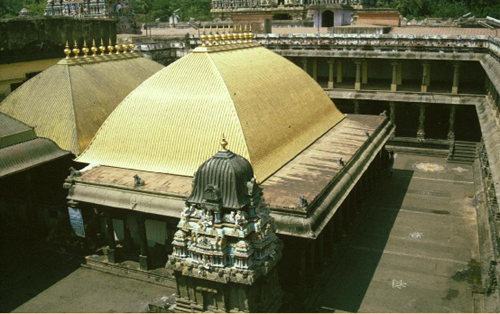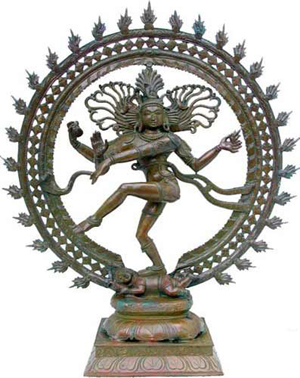Assuming the form of a sangama [a Virasaiva mendicant monk], he went to the place where Guru Namasivaya was staying and stood before him. When the Lord arrived, carrying a stick and a water pot, Guru Namasivaya was absorbed in the Self. As he came out of this state, he saw the elderly monk in front of him and exclaimed respectfully, ‘Slave of your feet!’
‘Where have you come from?’ asked Guru Namasivaya.
The sangama replied, ‘We reside at Tillaivanam [another name for Chidambaram]’.
‘And what is your name?’ enquired Guru Namasivaya.
‘My name is Ambalatthaduvar [The Dancer in the Hall].’
‘And what is the purpose of your coming here?’ asked Guru Namasivaya.
‘I need some food,’ said the sangama. ‘I went all over this place. Some people told Me that if I came here I would get some food.’
Guru Namasivaya told him, ‘Mother Parvati brings food for me every day. I don’t even have a vessel.’
The sangama responded by saying, ‘Here is the vessel,’ as He pointed at the moon.
Then, to demonstrate how he got his food, Guru Namasivaya looked in the direction of the Goddess, and some food immediately appeared.
Addressing the sangama, he said, ‘Please take this.’
The sangama refused, ‘I won’t take it,’ He said.
‘Why not?’
‘If you give me food every day in this way, only then will I take it. Not otherwise.’
‘You appear quite old,’ remarked Guru Namasivaya. ‘I travel about a lot to places like Kasi and Rameswaram. How can I promise that I will offer food to You every day? You may not be anywhere near me.’
‘If I walk in front of you,’ replied the sangama, ‘then you must give Me food. If I am behind you, I do not need food.’
Guru Namasivaya agreed: ‘If You stand in front of me I will give you food. Otherwise I will not.’
‘I agree to those terms,’ said the sangama. ‘I will stand in front of you if I need food.’
‘So now please eat,’ said Guru Namasivaya, offering him his first instalment of food.
The sangama then tried to revise the conditions, ‘If you offer food after first touching your vibhuti pouch or rudraksha beads, then I will take it.’
Guru Namasivaya refused to agree to these new conditions. He repeated his previous commitment: ‘If You stand before me, I will give You food.’
The sangama backed down. ‘Good,’ he said. ‘When I need food, I will come and stand in front of You.’
‘And if you do,’ reiterated Guru Namasivaya, ‘I will give you food.’
Guru Namasivaya was not yet aware that his visitor was Siva himself. When Siva asked for food to be given to Him every day, He was hinting that He wanted Guru Namasivaya to arrange for food to be served to Him every day in the temple. When Guru Namasivaya subsequently realised that Siva had been asking for such an endowment, he came into the temple to make all the arrangements. However, as will be seen later, the first installment he collected was used for a different kind of offering.
When Siva asked Guru Namasivaya to make his offer after touching his vibhuti and his rudraksha beads He was asking him to make a formal vow. For a Virasaiva, a vow taken while touching the vibhuti pouch would be an unbreakable commitment.
Siva finally assumed a position that indicated he was about to take Guru Namasivaya’s food, but before He took it He said, ‘I need water to quench my thirst’.
Guru Namasivaya made no attempt to serve Him personally.
‘The Tirupparkadal Tank is over there,’ he said, pointing in the right direction. ‘You can take water from there.’
The Lord did as He had been instructed, went to the tank and then suddenly disappeared. He reappeared in the temple, still in the guise of a sangama, and spoke to the three thousand priests.
‘I have arranged a plan. All of you should now take the palanquin in which I ride and all the ceremonial banners that have come into existence here for My sake. Get him into the palanquin, arrange all the banners around him, and then take him along all the four streets that surround the temple. Afterwards, bring him to Me.’
The priests took the palanquin and the banners, went to Guru Namasivaya and politely requested him to come to the temple with them.
When they asked him to get into the palanquin. Guru Namasivaya refused, saying, ‘Why a palanquin for me? There is no need.’
The three thousand priests responded by telling him, ‘This is not a palanquin, it is a lion-throne of emptiness [sunya simhasan], appropriate for a yogi like you’.
Guru Namasivaya, still disinclined to go with them, replied, ‘No, it is not fitting’. Then the priests tried a new approach.
‘Yesterday afternoon our Lord came to you. What did you tell him?’
Guru Namasivaya remembered the strange encounter he had had on the previous day and the thought came to him that the sangama may not have been just a simple monk. He went into a yogic trance and saw in that state that on the previous day it had been the Lord Himself, who had come and given him darshan.
He resumed his normal state and remarked to the priests, ‘After He came here, He must have gone to tell you what happened’.
When he finally understood what had been happening, he composed the following verse:
Appearing as a Virasaiva mendicant,
the Lord himself manifested to me
and asked me to give Him alms.
But when I offered Him food,
He bade me create all the Saiva endowments
to guarantee His service every day.
Only after reciting this verse did he finally consent to get into the palanquin. As he was being taken around the streets of Chidambaram, he sang another verse in praise of the Lord:
Will He cut out the affliction, the bond of twin karma,
and bestow His twin feet upon me?
Will He abolish future destined births
upon this great wide earth?
I do not know the divine will
of Tillai’s Lord, the Dancer in the Hall,
consort to Her whose breasts are ample and shapely
and to whom I daily raise my voice in praise.

Singing this song, he reached the temple. He disembarked from his palanquin near the flagpole, took off his sandals outside the Panchakshara Compound, walked into the Golden Hall and had darshan of the Lord there.
He then looked at the three thousand priests and asked them, ‘What endowments shall I create?’
The Lord Himself then spoke through an oracle in the temple: ‘Create sarva kattalai [a universal endowment, or an endowment for all purposes].’
Guru Namasivaya thought that if the Lord Himself gave a donation to start the endowment, and gave it in such a way that it was witnessed by all the assembled devotees, it would be certain that the endowment would continue forever. He therefore sang the following verse while holding a golden plate in his upraised hands:
Lord of Chidambaram!
You who held me in Your sway
in the form of the Guru who taught me!
I beg You for alms
to create a comprehensive endowment
to perform puja to Your lotus feet with love.
As soon as he had completed the singing of this verse in front of the Lord, a gold coin came from the sky and fell onto the plate. All those present said that the Lord himself had given a donation. Feeling that this was a sign that the Lord wanted them all to contribute, the devotees present gave an abundance of gold, pearls and other things. Guru Namasivaya handed over all these donations to the three thousand priests and began to walk away from them.
As he was attempting to leave, his steps faltered and he enquired rhetorically of the priests, ‘What is stopping me now?’
The priests, not knowing the answer, replied, ‘How can it be known to us?’
Guru Namasivaya again went into a yogic trance to ascertain the reason for his inability to leave.
When he resumed his normal state he enquired, ‘Has there been any jewellery made for the Lord?’
After thinking for some time they replied, ‘Tinkling anklets [silampu] and a girdle of tinkling bells [kinkini] have been made. That much we know. Apart from this, there is no other jewellery.’
On hearing this answer Guru Namasivaya called the temple artisans and said to them, ‘Silampu, kinkini and veerakantamani [a ring with little bells worn on the leg] have to be made. How much money will be needed?’
‘Fifty thousand gold coins.’ They answered, very optimistically.
Without querying the amount, he took all the money that had been collected and gave it to them, asking them to make the necessary jewels. All the jewellery that Guru Namsivaya ordered was associated with temple dancing. The different ornaments were designed to make a pleasant jingling sound when the dancer moved around.
Later, when he was resting, all the three thousand priests gathered together and spoke bitterly among themselves.
‘We all thought that we could benefit through him. But now he has given all the wealth to make jewellery!’
Then they all united in ridiculing him, saying, ‘If the Lord wears such expensive jewels, then He will have to dance as well.’
One of them also said, sarcastically, ‘So our Lord is now going to dance just for him.’

Guru Namasivaya heard all their comments. On the fortieth day, when all the jewellery had been completed and brought to him, he called all the three thousand priests and said to them, ‘If the Lord now dances, will you all be willing to witness it?’
To this they answered immediately, ‘How much merit must we have acquired to see such a sight! If we see it, twenty-one generations of our line will be redeemed.’
Then Guru Namasivaya thought to himself, ‘The people here are very sceptical. If the Lord moves, they may say that it is merely on account of the breeze.’